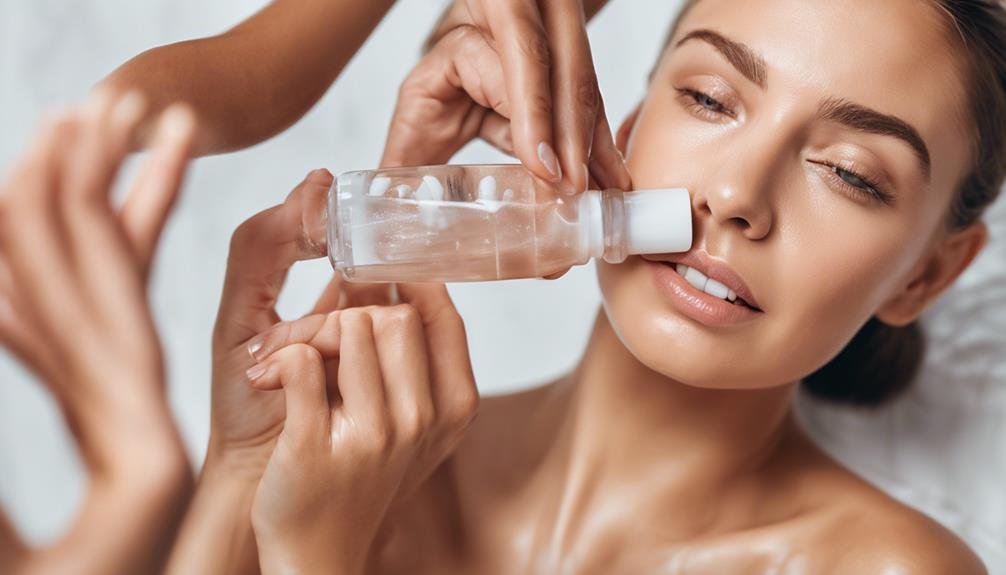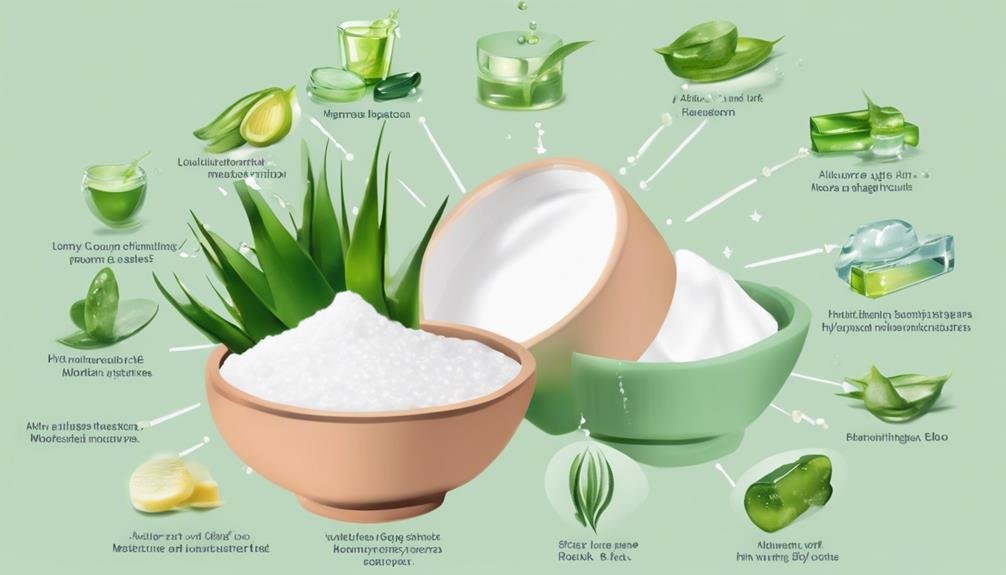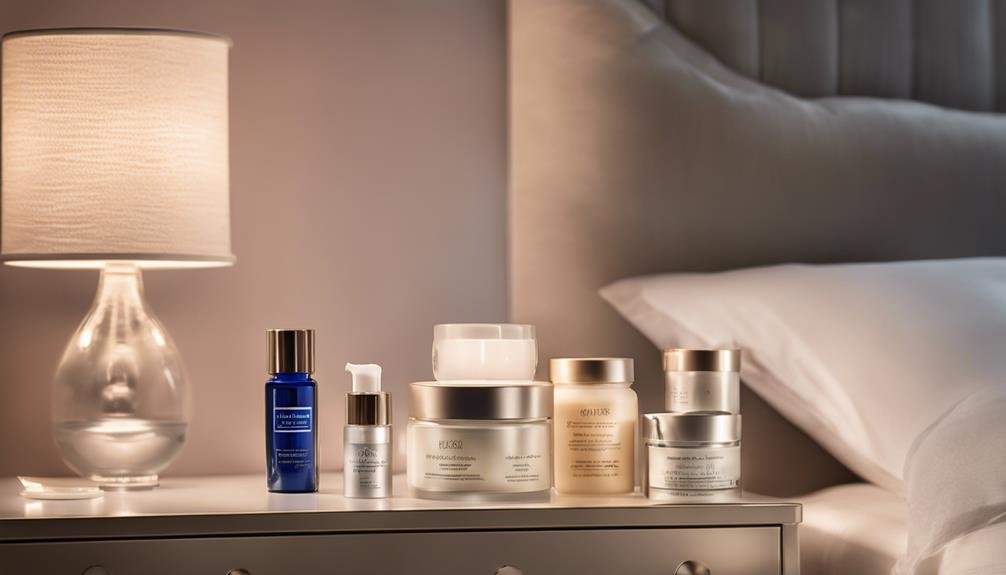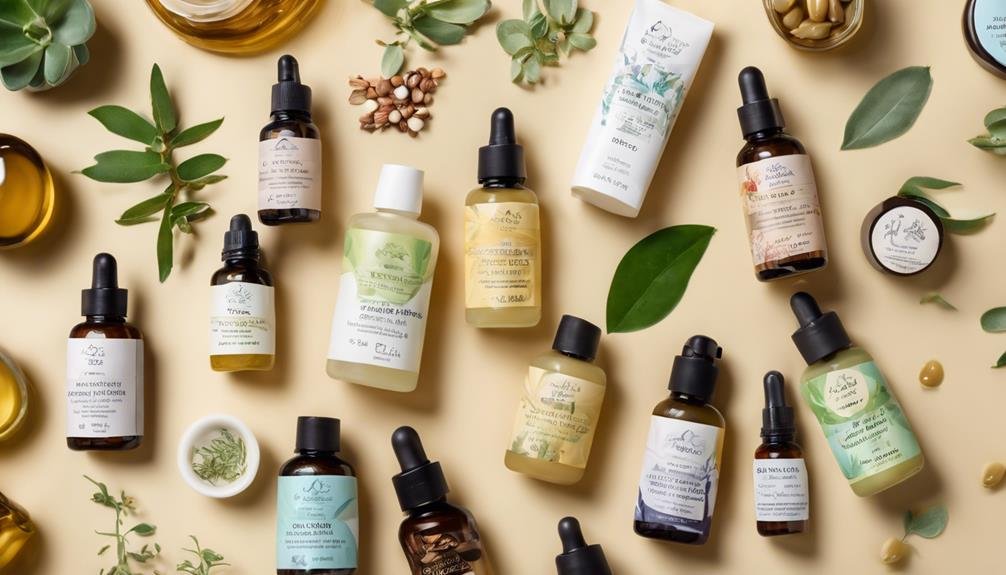If you've been searching for the key to maintaining long-lasting moisturization, there are a few crucial secrets you might want to consider. From hydrating from within to selecting the right moisturizer for your skin type, each step plays a vital role in achieving that coveted glow. But what about the lesser-known tips and tricks that can truly elevate your skincare routine? Stay tuned to uncover these hidden gems that could be the missing pieces to your ultimate hydration puzzle.
Key Takeaways
- Hydrate from within for lasting moisture.
- Choose hydrating moisturizers with key ingredients.
- Incorporate hyaluronic acid for skin hydration.
- Exfoliate for better product absorption.
- Use humectants to attract and retain moisture.
Importance of Hydrating From Within
Hydrating from within is a crucial aspect of achieving long-lasting moisturization for your skin. Proper hydration is essential for maintaining skin health and elasticity. When you drink an adequate amount of water daily, your skin cells are hydrated from the inside out. This helps to plump up the skin, reduce the appearance of fine lines and wrinkles, and create a more youthful complexion.
In addition to water, incorporating hydrating foods into your diet can also benefit your skin. Foods rich in omega-3 fatty acids, such as salmon and walnuts, help to strengthen the skin barrier and lock in moisture.
Fruits and vegetables high in antioxidants, like berries and spinach, can protect your skin from free radical damage and promote a radiant glow.
Choosing the Right Moisturizer
To ensure optimal skin health and hydration, selecting the right moisturizer tailored to your skin type and concerns is paramount. When choosing a moisturizer, consider the following:
- Skin Type Assessment: Understanding whether you have dry, oily, combination, or sensitive skin can help you narrow down the best moisturizer for your needs. Dry skin benefits from rich, creamy formulas, while oily skin may require oil-free or gel-based options.
- Ingredients List: Look for key ingredients like hyaluronic acid, glycerin, ceramides, and antioxidants, which can help lock in moisture, repair the skin barrier, and protect against environmental damage. Avoid harsh chemicals and fragrances that could irritate your skin.
- SPF Protection: If you spend time outdoors, consider a moisturizer with built-in SPF to shield your skin from harmful UV rays. This can prevent premature aging and reduce the risk of skin cancer.
Choosing a moisturizer with these factors in mind will help you achieve lasting hydration and maintain healthy, radiant skin.
Incorporating Hyaluronic Acid
Enhancing your skincare routine with the incorporation of hyaluronic acid can significantly boost your skin's hydration levels and overall health. Hyaluronic acid is a powerhouse ingredient known for its ability to hold up to 1000 times its weight in water, making it a key player in maintaining skin moisture. When applied topically, hyaluronic acid helps to replenish and retain moisture in the skin, giving it a plump and hydrated appearance.
This potent humectant is suitable for all skin types, including sensitive and acne-prone skin, as it's lightweight and non-comedogenic. By attracting and binding water to the skin, hyaluronic acid helps in improving skin elasticity and reducing the appearance of fine lines and wrinkles. Incorporating hyaluronic acid into your skincare routine, whether through serums, moisturizers, or masks, can result in a more hydrated, supple, and youthful complexion.
Choose products with varying molecular weights of hyaluronic acid for better penetration and hydration throughout different layers of the skin. Embrace the hydrating benefits of hyaluronic acid to achieve a radiant and healthy skin glow.
Exfoliating for Better Absorption
For optimal absorption of hydrating ingredients like hyaluronic acid, exfoliating plays a crucial role in preparing your skin. Exfoliation helps remove dead skin cells that can create a barrier, allowing moisturizers to penetrate deeper and work more effectively.
Here are three key points to consider when exfoliating for better absorption:
- Choose the Right Exfoliant: Opt for a gentle exfoliant that suits your skin type, such as a chemical exfoliant with alpha hydroxy acids (AHAs) or beta hydroxy acids (BHAs) for sensitive skin, or physical exfoliants like scrubs for tougher skin.
- Frequency Matters: Exfoliate 1-3 times a week, depending on your skin's tolerance. Over-exfoliation can damage the skin barrier, leading to dryness and irritation, so find the right balance for your skin.
- Follow Up with Hydration: After exfoliating, make sure to follow up with a hydrating moisturizer to lock in moisture and keep your skin nourished.
The Role of Humectants
After effectively preparing your skin through exfoliation for improved absorption of moisturizing ingredients, it's important to understand the significant role that humectants play in maintaining skin hydration.
Humectants are key components in skincare products that attract water molecules from the environment or the deeper layers of your skin, helping to keep your skin hydrated and supple. Common humectants include glycerin, hyaluronic acid, and sorbitol, which work by drawing moisture into the outer layer of your skin, preventing dryness and promoting a healthy skin barrier.
When selecting products with humectants, look for formulations that combine these ingredients with occlusives like petrolatum or dimethicone to seal in the moisture. This combination creates a powerful hydrating effect, ensuring that your skin retains moisture for longer periods.
Incorporating humectants into your skincare routine can benefit all skin types, especially if you have dry or dehydrated skin. Remember to follow up with a suitable moisturizer to lock in the hydration and maintain a smooth, glowing complexion.
Protecting Your Skin Barrier
To ensure optimal skin health and hydration, it's crucial to focus on protecting your skin barrier. Your skin barrier acts as a shield, preventing water loss and protecting against environmental stressors. Here are three key ways to safeguard your skin barrier:
- Use Gentle Cleansers: Harsh cleansers can strip away natural oils and disrupt the skin barrier. Opt for mild, non-abrasive cleansers that cleanse without causing irritation.
- Apply Sunscreen Daily: UV rays can damage the skin barrier, leading to dryness and premature aging. Make sunscreen a daily essential to shield your skin from harmful sun exposure.
- Moisturize Regularly: Keeping your skin well-hydrated is essential for maintaining a healthy barrier. Choose a moisturizer with ingredients like ceramides and hyaluronic acid to help repair and strengthen the skin barrier.
Nighttime Hydration Routine
Protecting your skin barrier during the day sets the foundation for a successful nighttime hydration routine. Nighttime is a crucial period for skin repair and rejuvenation, making your evening skincare routine essential for maintaining hydrated and healthy skin.
Begin by cleansing your face with a gentle, hydrating cleanser to remove impurities accumulated throughout the day. Follow up with a hydrating toner to balance your skin's pH levels and prepare it for better absorption of subsequent products. Incorporate a serum containing hyaluronic acid or glycerin to deeply hydrate your skin, promoting a plump and youthful complexion.
Next, seal in the moisture with a rich, nourishing night cream that contains ingredients like ceramides, peptides, or antioxidants. These will help repair your skin's barrier while you sleep, preventing moisture loss and enhancing overall hydration. Remember to pay special attention to the delicate skin around your eyes by applying a hydrating eye cream to combat dryness and fine lines.
Implementing a consistent nighttime hydration routine won't only keep your skin moisturized but also support its natural repair processes, leaving you with a radiant complexion every morning.
Hydrating Face Masks
For optimal hydration and rejuvenation, incorporating hydrating face masks into your skincare routine can be a game-changer. Hydrating face masks are a powerful tool to replenish moisture, leaving your skin supple and glowing.
Here are three key benefits of adding hydrating face masks to your skincare regimen:
- Deep Hydration: Hydrating face masks are formulated with ingredients like hyaluronic acid and glycerin, which deeply penetrate the skin to provide intense hydration. This helps in restoring moisture levels and improving skin elasticity.
- Nourishment and Repair: Many hydrating face masks contain vitamins, antioxidants, and natural extracts that nourish the skin and promote repair. These ingredients work together to revitalize your skin, leaving it soft and smooth.
- Enhanced Absorption: Using a hydrating face mask can enhance the absorption of other skincare products. By applying a face mask before your serums and moisturizers, you create a hydrated canvas that allows subsequent products to work more effectively.
Incorporating hydrating face masks into your routine can help you achieve a more hydrated, radiant complexion.
Hydration From the Inside Out
Ensuring adequate hydration from the inside out is crucial for maintaining healthy skin. Drinking enough water throughout the day is essential for keeping your skin hydrated and supple. Water helps to flush out toxins from your body, leading to clearer and more radiant skin.
Additionally, incorporating hydrating foods into your diet can further support your skin's moisture levels. Foods rich in antioxidants, such as berries, spinach, and nuts, can help protect your skin from oxidative stress and keep it looking youthful. Omega-3 fatty acids found in fish, flaxseeds, and walnuts can also help maintain your skin's natural oil barrier, preventing moisture loss.
Furthermore, herbal teas like green tea and chamomile can provide hydration while offering additional skin benefits. Green tea is packed with antioxidants that can help protect your skin from damage, while chamomile has anti-inflammatory properties that can soothe and hydrate your skin from within.
Benefits of Facial Oils
To maintain optimal skin hydration and enhance moisture retention, incorporating facial oils into your skincare routine can offer a multitude of benefits. Facial oils are a luxurious addition to your regimen that can provide nourishment and protection to your skin.
Here are three key advantages of using facial oils:
- Deep Hydration: Facial oils are rich in emollients and occlusives that help seal in moisture, preventing dehydration and keeping your skin supple and soft.
- Nutrient-Rich Formulas: Many facial oils contain essential fatty acids, antioxidants, and vitamins that nourish the skin, promoting a healthy complexion and combating signs of aging.
- Enhanced Skin Barrier: By reinforcing the skin's natural lipid barrier, facial oils help strengthen and protect against environmental stressors, reducing moisture loss and maintaining a healthy skin barrier function.
Incorporating facial oils into your skincare routine can be a game-changer, offering a natural and effective way to keep your skin hydrated, nourished, and radiant.
Avoiding Harsh Ingredients
Making informed choices about skincare products involves being mindful of the ingredients that can potentially harm your skin. Harsh ingredients like sulfates, parabens, synthetic fragrances, and alcohol can strip your skin of its natural oils, leading to dryness and irritation. When selecting moisturizers, opt for products that are free of these harmful additives. Look for gentle, nourishing ingredients such as hyaluronic acid, ceramides, and natural oils like jojoba or argan oil.
Sulfates, commonly found in cleansers and body washes, can be particularly harsh on the skin, causing dryness and inflammation. Parabens, used as preservatives, have been linked to hormone disruption. Synthetic fragrances and alcohol can aggravate sensitive skin, leading to redness and discomfort.
Consistent Moisturization Habits
To maintain optimal skin hydration levels and promote a healthy skin barrier, it's vital to establish consistent moisturization habits.
- Morning and Night Routine: Start and end your day with a moisturizer that suits your skin type. This consistency helps lock in hydration throughout the day and night.
- Reapplication Throughout the Day: Carry a travel-sized moisturizer with you to reapply as needed, especially in dry environments or after washing your hands. Consistent reapplication helps prevent moisture loss.
- Hydrating From Within: Remember to drink an adequate amount of water daily. Hydrating your body from the inside out complements your external moisturization routine, leading to supple and healthy skin.
Frequently Asked Questions
Can Over-Moisturizing Lead to Skin Problems?
Over-moisturizing can indeed lead to skin problems. It can clog pores, cause breakouts, and create an imbalance in your skin's natural oils. Moderation is key. Listen to your skin's needs, and adjust your routine accordingly.
Should I Moisturize My Neck and Chest Too?
Yes, you should moisturize your neck and chest to maintain skin health and hydration. These areas are prone to dryness and can benefit from regular moisturization. Use a product suited to your skin type for best results.
Can Using a Humidifier Improve Skin Hydration?
Using a humidifier can indeed improve skin hydration. Did you know that humidity levels below 30% can cause skin dryness? By adding moisture to the air, a humidifier helps retain skin's natural hydration, promoting a healthier complexion.
Is It Necessary to Adjust My Moisturizer Seasonally?
You should adjust your moisturizer seasonally to cater to changing skin needs. In colder months, opt for richer creams, while lighter lotions work well in warmer weather. Adapting your skincare routine can help maintain optimal hydration levels throughout the year.
Can Stress Affect Skin Moisture Levels?
Stress can indeed affect skin moisture levels due to its impact on hormone levels and skin barrier function. When stressed, your body releases cortisol, which can lead to decreased skin hydration. Proper stress management can help maintain skin moisture balance.
Conclusion
In conclusion, by hydrating from within, choosing the right moisturizer, and incorporating key ingredients like hyaluronic acid, you can achieve long-lasting moisturization for a healthy and glowing complexion. Remember, consistency is key – like a well-oiled machine, maintaining a regular skincare routine and staying hydrated throughout the day will help keep your skin moisturized and radiant. Keep up the good work, and your skin will thank you!







